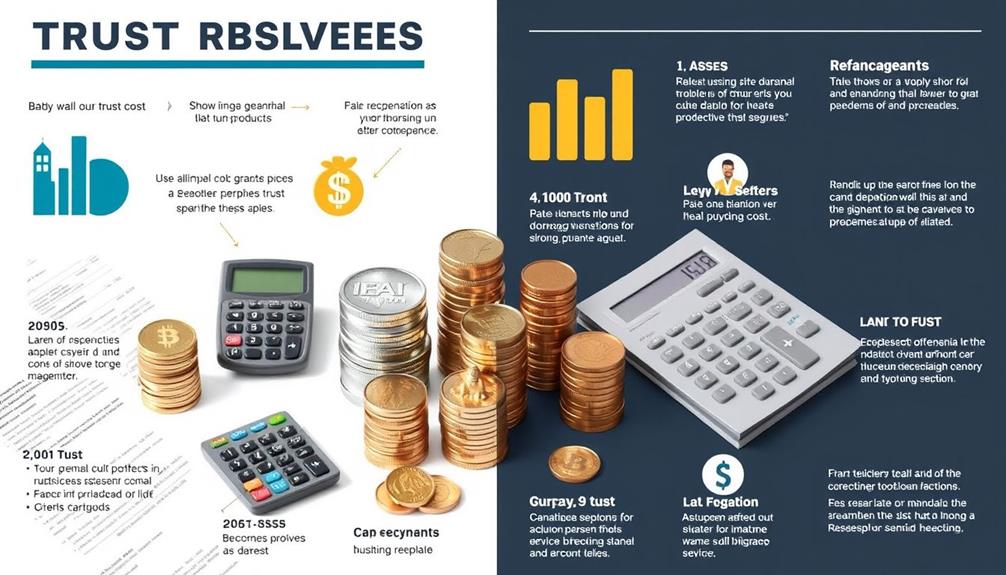If you're serious about protecting your wealth, establishing a trust is essential, especially if your net worth hits $10 million or more. Trusts not only safeguard your assets from lawsuits and creditors, but they also streamline probate processes, saving you and your heirs time and money. They're not just for the ultra-wealthy; anyone can benefit from their tax advantages and tailored wealth management strategies. By understanding the different types of trusts and their specific benefits, you can make informed decisions that align with your financial goals. There's much more to uncover about effective strategies tailored just for you!
Key Takeaways
- Establishing a trust is crucial for individuals with a net worth of $10 million or more to protect their wealth effectively.
- Trusts safeguard assets from lawsuits and creditors, reducing vulnerability associated with wealth accumulation.
- Irrevocable trusts can provide significant tax benefits, helping to minimize estate and capital gains taxes.
- Professional guidance ensures trusts align with unique financial situations and adapt to evolving legal requirements.
- Trusts streamline asset distribution, bypass probate, and minimize disputes among heirs, preserving wealth for future generations.
Understanding Trusts and Their Purpose
Trusts are powerful financial tools that can help you manage and protect your assets effectively. By establishing a trust, you create a fiduciary agreement where a trustee manages your assets on behalf of your beneficiaries. This structured method allows for precise asset distribution and management, guaranteeing your wishes are honored after your death.
Additionally, trusts can also provide risk management strategies that safeguard your wealth from potential market volatility. Trusts serve multiple purposes beyond wealth preservation and can benefit individuals across various income levels. They provide a reliable strategy for asset protection, especially for minors or those who may not manage their finances well. With the help of an estate planning attorney, you can tailor your trust to meet your unique needs.
One of the most significant advantages of trusts is their ability to bypass the probate process. This means your assets can be transferred smoothly, minimizing disputes among heirs and streamlining the overall process.
The Million Threshold

When your net worth hits the $10 million mark, it's time to seriously consider establishing a trust. This threshold isn't just a number; it represents a point where wealth protection strategies become essential.
Creating a personal budget can also help manage your assets more effectively. By setting up a trust, you can safeguard your assets and guarantee your financial goals are met.
Importance of Trusts
For individuals with a net worth exceeding $10 million, the importance of trusts becomes strikingly clear. At this level, effective asset protection and estate planning are no longer optional; they're essential. Trusts offer tailored strategies specifically designed for high net worth individuals, safeguarding your wealth from potential legal threats.
Many people mistakenly believe that trusts are just for the ultra-wealthy, but the $10 million threshold emphasizes the necessity of these financial tools. Additionally, incorporating alternative investments like a Gold IRA can further enhance your portfolio's resilience against economic fluctuations, providing a hedge during uncertain times, especially for those with substantial assets seeking long-term capital appreciation.
Establishing a trust provides significant benefits, including enhanced asset protection, tax savings, and streamlined distribution to your beneficiaries. With the complexities of wealth management increasing, trusts can serve as a cornerstone in your financial planning arsenal. They allow you to protect assets while ensuring your wishes are honored after your passing.
Engaging with financial advisors becomes vital as you cross this threshold. They can help you tailor the trust to align with your wealth management goals, maximizing protection and efficiency. The importance of trusts can't be overstated; without them, you risk exposing your wealth to unnecessary threats and complications.
Wealth Protection Strategies
As you reach the $10 million net worth threshold, implementing effective wealth protection strategies becomes essential to safeguarding your financial legacy. At this level, the risk of asset loss increases, making it vital for high-net-worth individuals like you to evaluate trusts as a primary tool for asset protection and estate planning.
In addition to trusts, exploring options like a trusted Gold IRA can further enhance your wealth security by diversifying your assets against market volatility. You need trusts not just for their perceived exclusivity but for the tailored solutions they offer. A trust fund can effectively shield your assets from potential lawsuits and creditor claims, ensuring your financial future remains secure.
Misconceptions might suggest that trusts are only for the ultra-wealthy, but crossing the $10 million mark changes the game—you must protect assets wisely. Engaging in proactive strategies is key. Professional guidance will help you set up a trust that aligns with your unique financial situation, maximizing the benefits of asset protection.
Risks of Wealth Accumulation

Wealth accumulation brings significant risks that can threaten your financial stability. As you build your wealth, the need for effective asset protection becomes increasingly essential. High-net-worth individuals like yourself face a heightened vulnerability to lawsuits and creditor claims, placing your hard-earned assets at risk.
In fact, approximately 70% of people in your financial bracket encounter legal actions during their lifetime, underscoring the importance of proactive planning. Additionally, considering alternative investments such as a Gold IRA can provide a safeguard against market fluctuations that may impact your net worth.
The financial implications of these threats can be staggering, with the average cost of defending a lawsuit exceeding $50,000. Without proper asset protection strategies, you could experience substantial losses. Divorce settlements often target wealthy individuals, making it imperative to have protective measures in place, such as trusts, to shield your assets from potential claims.
Failing to implement effective asset protection can jeopardize your wealth and financial stability. By prioritizing protective strategies, you can safeguard your assets and guarantee that your accumulated wealth remains intact, allowing you to enjoy the fruits of your labor without constant fear of loss.
Protecting your financial future starts with understanding the risks associated with wealth accumulation.
Benefits of Trusts for High Earners

Trusts offer high earners a powerful tool to secure their financial future and manage their wealth effectively. In today's climate, characterized by increasing investor preferences for responsible investing and the need for transparency, trusts can also help in aligning financial goals with sustainability.
For high-net-worth individuals, trusts provide tailored solutions that guarantee asset protection and smooth estate planning. Here are some key benefits you'll enjoy:
- Shield your assets from lawsuits and creditors, reducing financial vulnerability.
- Save on costs associated with probate, guaranteeing your assets transfer smoothly upon death.
- Optimize tax strategies to achieve significant savings on estate and capital gains taxes.
Trust Types and Their Advantages

When considering the best way to manage your assets, understanding the various types of trusts available can greatly enhance your financial planning. This is particularly important in the context of divorce proceedings, where asset protection becomes a priority.
Trust types vary considerably, each offering unique advantages tailored to your needs. Revocable trusts provide flexibility, allowing you to make changes during your lifetime, which can be beneficial for asset protection and family wealth management.
On the other hand, irrevocable trusts offer tax benefits and solidify your financial plans, although they can't be altered once established.
If you have a loved one with disabilities, special-needs trusts guarantee they receive support without losing access to crucial government assistance programs.
For those focused on philanthropy, charitable trusts enable you to achieve your charitable goals while enjoying potential tax advantages, like income or estate tax deductions.
Costs Associated With Establishing a Trust

Establishing a trust can offer significant benefits, but it's important to contemplate the associated costs before making a decision. Understanding these costs can help you prepare for the financial commitment involved in trust management.
When considering a trust, it's essential to evaluate the potential advantages such as diversification benefits from holding assets alongside the expenses involved.
- Your hard-earned money could be at stake.
- You might face unexpected fees that drain your resources.
- The complexity of your assets could lead to mounting expenses.
Initial setup fees usually involve hiring an attorney, which can range from a few hundred to several thousand dollars, depending on the trust's complexity and the attorney's rates.
Then there are ongoing expenses, like trustee fees, which generally range from 0.5% to 1% of the total trust assets annually. These fees contribute to the overall costs associated with establishing a trust.
Additionally, don't forget about tax preparation fees based on the trust's income. While establishing a trust can help you avoid significant probate costs, the total expenses for setting up and maintaining one can range from several thousand to tens of thousands of dollars, depending on asset complexity and professional fees.
Always weigh these costs against potential wealth protection.
Evaluating Personal Financial Situations

Before diving into the world of trusts, it's essential to evaluate your personal financial situation. Start by reviewing your current assets, liabilities, and potential future income streams. This evaluation will help you determine if the asset protection a trust offers is necessary for you, especially if your net worth is $10 million or more.
Additionally, understanding the implications of financial considerations for elderly care can provide further context on how trusts might play a role in your overall financial strategy.
Understanding estate tax implications is significant; strategic trust planning can mitigate estate taxes that often come with substantial net worth. Take time to analyze your beneficiaries' needs, as this will guide your choice of trust type and structure. For instance, if you have minors or individuals with disabilities in your family, their specific requirements can influence how you set up the trust.
Don't hesitate to seek expert advice. Consulting with an estate planning professional can provide valuable insights tailored to your unique financial situation. They can help guarantee that your trust aligns with your long-term wealth management goals, maximizing benefits for you and your beneficiaries.
In short, reviewing personal financial situations is the first step toward protecting your wealth effectively.
Engaging Professionals for Trust Setup

Setting up a trust can feel overwhelming, but engaging a professional estate planning attorney simplifies the process notably.
These experts help guarantee your trust aligns with your financial goals and meets all legal requirements. They can guide you through the complexities of different trust types, like revocable or irrevocable trusts, to find the best fit for your situation.
Additionally, just like selecting the right cold medication for effective relief, choosing the right professionals can greatly impact the success of your wealth protection strategy. Consider taking into account the importance of selecting the right cold medication when making decisions about your financial health.
Consider the emotional benefits of working with professionals:
- Peace of Mind: You'll know your wealth is protected legally.
- Tailored Strategies: Professionals can adjust your trust as laws or personal circumstances change.
- Cost-Effective Solutions: Investing $1,500 to $3,000 in professional help can save you from probate costs exceeding $10,000.
Utilizing professionals guarantees compliance with legal regulations, preventing issues like fraudulent conveyance that could jeopardize your asset protection strategies.
Regular consultations with financial advisors not only enhance your trust's effectiveness but also keep it aligned with your evolving financial landscape.
By taking this step, you're not just safeguarding your wealth; you're building a solid foundation for future generations.
Long-Term Wealth Protection Strategies

Protecting your wealth for the long term requires strategic planning, especially if your net worth hits $10 million or more. For high-net-worth individuals like you, establishing trusts is vital for effective asset protection. Trusts can shield your wealth from lawsuits, creditors, and the uncertainties of personal liability, ensuring that your financial legacy remains intact.
One of the most impactful proactive strategies involves utilizing irrevocable trusts. By transferring assets into these trusts, you remove them from your taxable estate, which can greatly reduce estate taxes. This not only preserves your wealth but also enhances your long-term wealth protection.
Moreover, addressing financial vulnerabilities is essential. Incorporating specialized asset protection strategies, such as Medicaid asset protection trusts, can safeguard your assets from healthcare-related costs while allowing you to qualify for essential government assistance programs.
Conclusion
So, you thought accumulating wealth was all about hard work and savvy investments, right? Ironically, it's often the very money you've earned that puts you at risk. By setting up a trust, you're not just protecting your fortune; you're crafting a fortress around it. It's like building a moat only to realize you're the king inside. Embrace the irony: while you hustle for every dollar, a trust is your best ally in safeguarding your legacy.









